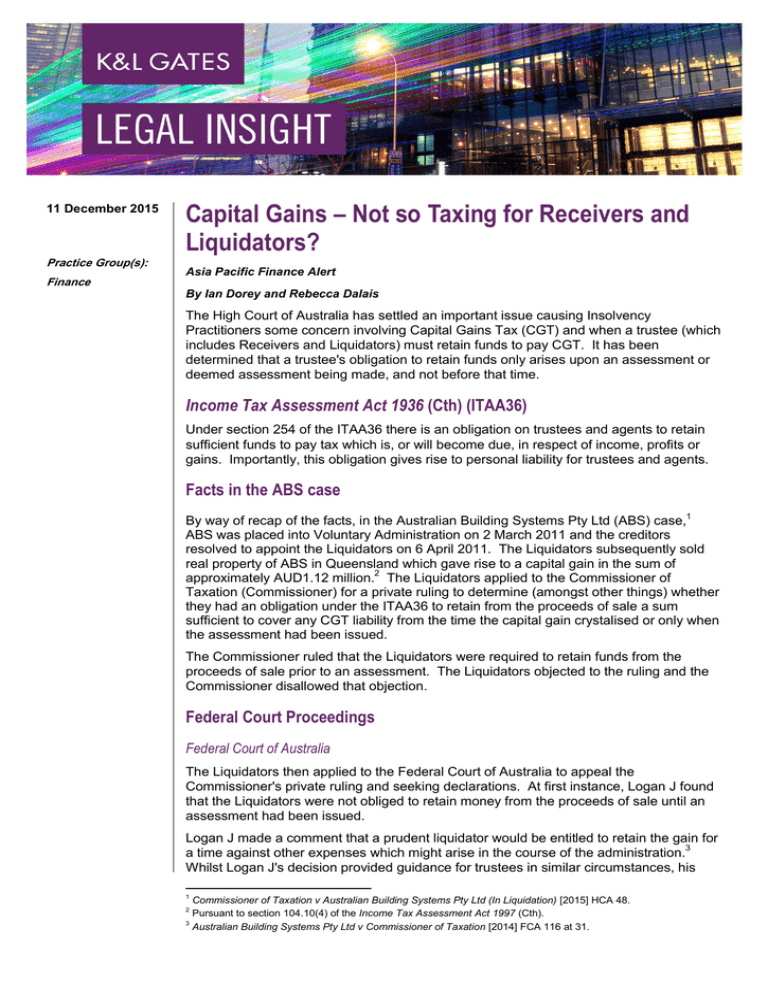
11 December 2015
Practice Group(s):
Finance
Capital Gains – Not so Taxing for Receivers and
Liquidators?
Asia Pacific Finance Alert
By Ian Dorey and Rebecca Dalais
The High Court of Australia has settled an important issue causing Insolvency
Practitioners some concern involving Capital Gains Tax (CGT) and when a trustee (which
includes Receivers and Liquidators) must retain funds to pay CGT. It has been
determined that a trustee's obligation to retain funds only arises upon an assessment or
deemed assessment being made, and not before that time.
Income Tax Assessment Act 1936 (Cth) (ITAA36)
Under section 254 of the ITAA36 there is an obligation on trustees and agents to retain
sufficient funds to pay tax which is, or will become due, in respect of income, profits or
gains. Importantly, this obligation gives rise to personal liability for trustees and agents.
Facts in the ABS case
By way of recap of the facts, in the Australian Building Systems Pty Ltd (ABS) case,1
ABS was placed into Voluntary Administration on 2 March 2011 and the creditors
resolved to appoint the Liquidators on 6 April 2011. The Liquidators subsequently sold
real property of ABS in Queensland which gave rise to a capital gain in the sum of
approximately AUD1.12 million.2 The Liquidators applied to the Commissioner of
Taxation (Commissioner) for a private ruling to determine (amongst other things) whether
they had an obligation under the ITAA36 to retain from the proceeds of sale a sum
sufficient to cover any CGT liability from the time the capital gain crystalised or only when
the assessment had been issued.
The Commissioner ruled that the Liquidators were required to retain funds from the
proceeds of sale prior to an assessment. The Liquidators objected to the ruling and the
Commissioner disallowed that objection.
Federal Court Proceedings
Federal Court of Australia
The Liquidators then applied to the Federal Court of Australia to appeal the
Commissioner's private ruling and seeking declarations. At first instance, Logan J found
that the Liquidators were not obliged to retain money from the proceeds of sale until an
assessment had been issued.
Logan J made a comment that a prudent liquidator would be entitled to retain the gain for
a time against other expenses which might arise in the course of the administration.3
Whilst Logan J's decision provided guidance for trustees in similar circumstances, his
1
Commissioner of Taxation v Australian Building Systems Pty Ltd (In Liquidation) [2015] HCA 48.
Pursuant to section 104.10(4) of the Income Tax Assessment Act 1997 (Cth).
3
Australian Building Systems Pty Ltd v Commissioner of Taxation [2014] FCA 116 at 31.
2
Capital Gains – Not so taxing for Receivers and Liquidators
comment caused some confusion for Insolvency Practitioners looking to distribute
proceeds from the sale of assets where CGT liabilities may arise.
Full Court of the Federal Court of Australia
The Commissioner appealed the decision of Logan J to the Full Court of the Federal
Court of Australia (Full Court). However, the Full Court dismissed the Commissioner's
appeal.
High Court Decision
The Commissioner's appeal of the Full Court's decision to the High Court was dismissed
in a 3-2 decision.
In their reasoning, each judge looked at the previous High Court decision in the case of
Bluebottle UK Limited v Deputy Commissioner of Taxation4. In that case, the High Court
considered the construction of the words 'sufficient to pay the tax which is or will become
due"' pursuant to section 255 of the ITAA36.
The majority of French CJ, Keifel J and Gageler J in the High Court in the ABS case
determined that in line with the Bluebottle case, the retention obligation was limited to
retaining money after an assessment has been made. Gageler J concluded that this
result produced certainty as to the total amount to be retained.5
Gageler J also considered that this position minimises the potential for disharmony
between the obligations and liabilities of a liquidator under section 254 of the ITAA36 and
under Chapter 5 of the Corporations Act 2001 (Cth).6
What does this mean for Insolvency Practitioners?
On the basis of the High Court decision the obligation to retain funds by a trustee for
CGT does not arise until a tax assessment has been issued (not when the asset is sold).
It appears that the obligation to retain funds attached to any money which comes to the
liquidator after an assessment has been issued. Whether Liquidators follow the
suggestion made at first instance by Logan J to retain funds until an assessment is
issued, will be a decision each will need to make on an individual basis. Liquidators will
need to balance that practice against the interest of all creditors who want to be paid a
dividend. The decision may lead to some legislative change in favour of the
Commissioner so it is still a matter of "watch this space".
Authors:
Ian Dorey
ian.dorey@klgates.com
+61.07 3233 1236
Rebecca Dalais
rebecca.dalais @klgates.com
+61.07 3233 1277
4
[2007] HCA 54.
Commissioner of Taxation v Australian Building Systems Pty Ltd (In Liquidation) [2015] HCA 48 at 60.
6
Commissioner of Taxation v Australian Building Systems Pty Ltd (In Liquidation) [2015] HCA 48 at 63.
5
2
Capital Gains – Not so taxing for Receivers and Liquidators
Anchorage Austin Beijing Berlin Boston Brisbane Brussels Charleston Charlotte Chicago Dallas Doha Dubai Fort Worth Frankfurt
Harrisburg Hong Kong Houston London Los Angeles Melbourne Miami Milan Moscow Newark New York Orange County Palo Alto
Paris Perth Pittsburgh Portland Raleigh Research Triangle Park San Francisco São Paulo Seattle Seoul Shanghai Singapore
Spokane Sydney Taipei Tokyo Warsaw Washington, D.C. Wilmington
K&L Gates comprises more than 2,000 lawyers globally who practice in fully integrated offices located on five
continents. The firm represents leading multinational corporations, growth and middle-market companies,
capital markets participants and entrepreneurs in every major industry group as well as public sector entities,
educational institutions, philanthropic organizations and individuals. For more information about K&L Gates or
its locations, practices and registrations, visit www.klgates.com.
This publication is for informational purposes and does not contain or convey legal advice. The information herein should not be used or relied upon
in regard to any particular facts or circumstances without first consulting a lawyer.
© 2015 K&L Gates LLP. All Rights Reserved.
3





